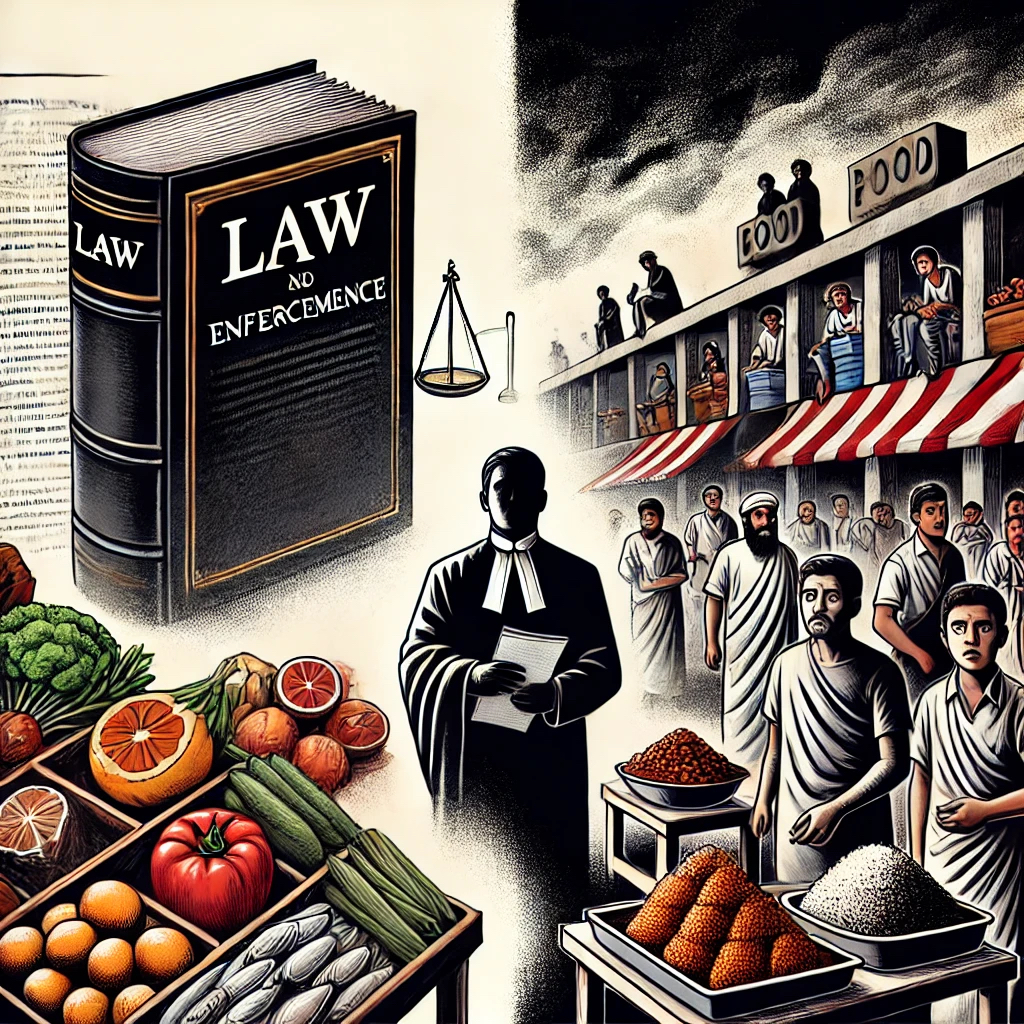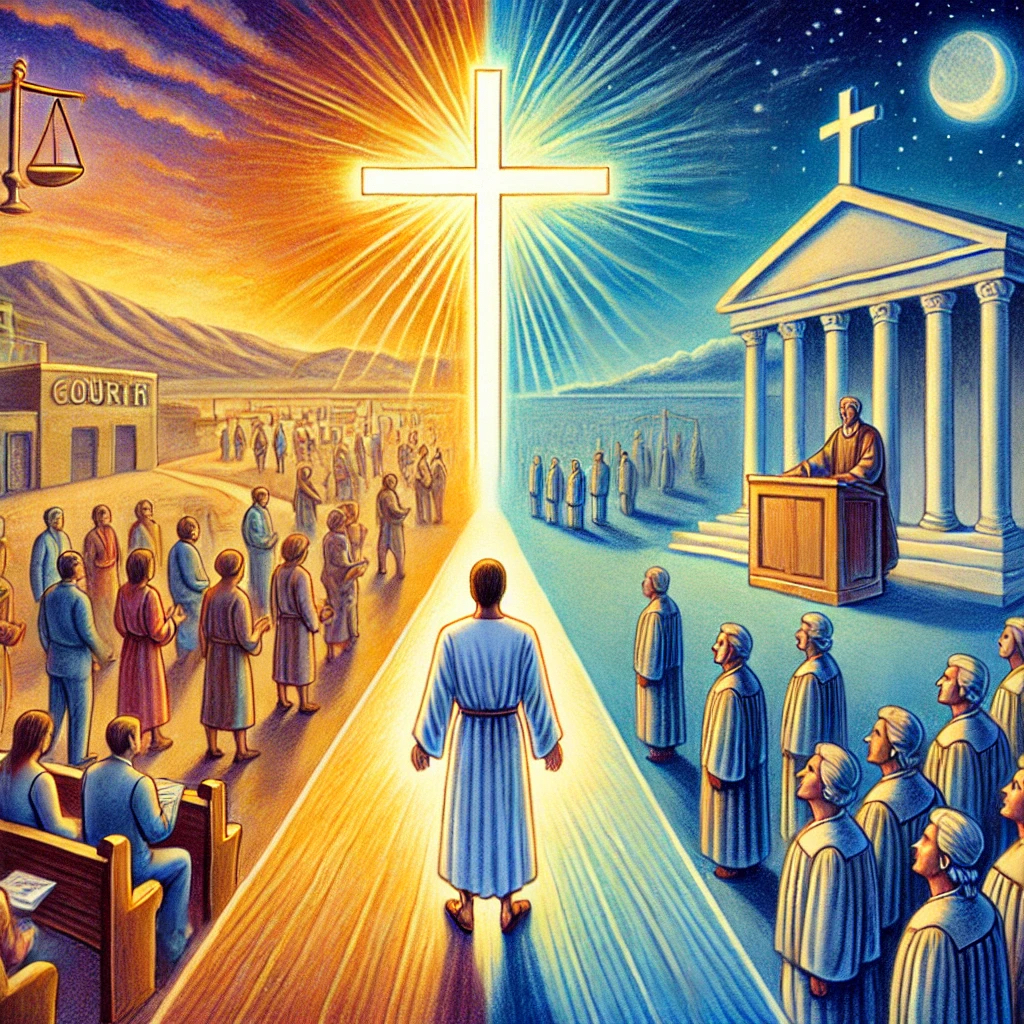引言
今天聊一个话题,似乎是与我们相距甚远但又近在眼前,很多人不理解许多冠以“中国特色社会主义”修饰的名词,比如宪法、法治、道路、文化、制度、理论体系等等,这些词被修饰后的含义迥然不同,今天说的是法治,即中国特色社会主义法治,以及与“人治”的关系。在基督徒的群体中往往会有另一种看法,认为中国特色社会主义+上述名词与圣经里描述的权柄似有张力,以至于无法理解生活工作中许多潜在的认知冲突,今天就本着和谐的目的一并说明一下。
中国特色社会主义法治自提出以来,始终围绕“依法治国”的目标发展。在这一体系中,“人治”与法治并存,两者既相辅相成,又存在一些紧张关系。无论在中国还是其他社会,法治与“人治”始终同时存在。为什么呢?法治体现了“人治”的普遍性,作为一种制度化的手段,用以维持秩序和治理社会;而“人治”则体现了法治的特殊性和统治者的政治目的,尤其在关键决策和统治者意志强烈干预的情况下,法律往往会受到个别权力的影响。因此,要正确理解中国特色社会主义法治的本质,必须明白这两者是如何交织的,然后才能进一步理解上帝的权柄和撒但的作为在其中的关系。

一、从秦朝到当代:中国历史中的“人治”与法治
1. 秦朝:严刑峻法下的法治与“人治”结合
秦朝以法家思想为指导,推行严酷的法治,通过商鞅变法确立了“以法治国”的原则。秦始皇通过法律维护中央集权,要求全民遵守。然而,秦朝的法治本质上是皇帝个人意志的体现,“人治”的色彩非常浓厚。虽然法治强调了普遍的规则和秩序,但其具体实施依然取决于统治者的决策与个人权威。这是法治体现“人治”普遍性与特殊性的重要例证。
优势:统一国家的强力手段,快速建立了高效的政治秩序。
弊端:法治缺乏人性关怀,过度集中权力导致社会矛盾积累,所以处处充满张力的秦朝灭亡的也很快、很惨,功过无所谓“参半”,只是不要过度颂扬。
2. 汉唐时期:法治与德治并行
汉朝与唐朝强调法治与德治结合,比如汉初的宽政政策和唐代的《唐律疏议》。在这种背景下,法律作为维护国家秩序的工具,其普遍性确保了社会规则的执行,但皇帝的个人意志仍然在法律之上发挥作用。法律的实施受制于个人判断,这反映了“人治”的特殊性,即法律的弹性和灵活性。
优势:法律体系逐渐完善,兼顾了社会稳定与统治者的灵活施政。
弊端:法治的实施往往依赖皇帝个人的德行与意志,缺乏长期制度保障。
3. 明清时期:专制皇权下的“人治”为主
明清时期,法律成为维护君主专制的工具,“人治”强于法治。虽然明代有《大明律》,清代有《大清律例》,这些法律形式上维护社会秩序,但实际上法律更多是皇权的延伸,统治者的意志凌驾于法律之上。这一现象体现了法治的普遍性与“人治”的特殊性共存:法律是广泛适用的规则,但其实际执行高度依赖于权力中心。
优势:法律体系较为完备,在相对和平时期起到了稳定社会秩序的作用。
弊端:皇帝个人意志过强,法律的独立性和普适性受到限制,容易导致腐败与权力滥用。
4. 当代中国:中国特色社会主义法治
新中国成立后,党和国家领导人对“人治”和法治的关系也在逐渐从“人治”向法治过渡,直至到今天逐渐平衡。1958年8月21日,毛泽东在北戴河政治局扩大会议上说:“法律这个东西没有不行,但我们有我们的一套”。“......我们的规章制度,大多数、90%是司局搞的,我们基本上不靠那些,主要靠决议、开会,一年搞四次,不靠民法、刑法来维持秩序”。刘少奇也在插话中讲到:“到底是法治还是人治?看来实际靠人,法律只能作办事的参考。”(参见中国人大网2012年万一:《我国民事立法的历史发展与最新成就》)。
改革开放以来,中国逐步推进依法治国的建设,形成了较为完善的法律体系。然而,中国的法律制度同时依赖于党的领导,体现了法治与“人治”的交织关系。法律的普遍性体现在社会管理中,但党的领导使得“人治”的特殊性依然存在,特别是在政治与经济的关键领域,法律的解释和实施往往依赖于统治者或党组织的意志。这么说并不是缺少褒义,而是现实政治的必要,无可非议。
然而,在某些实际操作中,“人治”不发话,法治就如同摆设,一些社会弊端由此而生。比如,食品安全问题就是典型的例子。尽管有明确的法律法规禁止生产和销售有毒有害食品,但这些食品依然在市场上大行其道,问题长期无人过问,给社会和消费者带来极大危害。表面上看,法律已经明确了规范和惩戒措施,但实际执行却缺乏实质效果。这说明,如果没有明确的“人治”的权力发话,法律的执行常常会被忽视,甚至变得无效。这种现象反映出“人治”的特殊性:法律的运行不仅依赖制度,还必须依赖权力即“人治”的介入和推动。换句话说,领导不发话,制度不能随便运作,非领导发话属于造谣,制度更不能运作。

优势:法治与国家发展战略紧密结合,保障了国家的持续发展与稳定。
弊端:法律的独立性有限,法治在某些情况下可能被视为“人治”的延伸,导致法律缺乏足够的执行力,尤其在涉及公共安全和社会利益时,执行中的不作为现象突出。
二、美国的法治实践:权力制衡与法律独立性
与中国不同,美国的法治体系建立在权力制衡和法律独立性的基础上。宪法确立了三权分立的原则,法律的普遍性体现在不受个人或政党的控制,法官独立行使职权。这使得美国的法律具有高度的稳定性,但由于法律无法灵活应对复杂的政治环境,法律的刚性有时也成为改革的障碍。相较于中国,美国的法治更独立于统治者的个人意志,但也因此缺乏应对突发情况的灵活性。
优势:法律具有高度的独立性,防止权力滥用,公民权利得到广泛保障。
弊端:法律体系相对僵化,政治斗争和利益冲突可能导致法律程序过于冗长,改革难以迅速推进。
三、中美法治对比:权力与法律的不同交织
通过中美法治的对比可以看到:
- 中国的法治与“人治”同时存在,法治作为普遍的规则,服务于党和国家的政治目标,而“人治”体现为法律的解释和执行时灵活性较大,尤其在关键决策中依赖领导人对时局的权衡利弊判断。
- 美国的法治更强调独立性,权力制衡机制确保法律不受个人影响,这种模式下法治的普遍性得以体现,但法律的刚性使其在政治突发情况下反应较慢。
这个话题不是今天的重点,在此略过。
四、基督徒如何正确理解中国特色社会主义法治
对于中国的基督徒而言,理解中国特色社会主义法治的本质尤其重要。正如《罗马书》13章所说,基督徒应当顺服掌权者,因为“在上有权柄的,人人当顺服他,因为没有权柄不是出于神的”。法治与“人治”并存的现实,不仅体现了社会治理的复杂性,也是基督徒顺服国家法律的基础。在这种法治与“人治”共存的环境中,基督徒应当尊重法律的普遍性,并理解在某些情况下,法律的执行可能带有一定的灵活性和特殊性。
基督徒可以通过以下两点正确理解法治与“人治”的关系:
- 理解法律背后的政治意图:中国的法律体系与党的领导密不可分,法律的普遍性服务于国家的长远发展,因此基督徒应尊重并顺服法律,并在合法的框架下生活与实践信仰。
- 在法治与“人治”共存中活出信仰:基督徒应理解到,在不同社会中,“人治”与法治不可避免地同时存在,并在实际生活中找到平衡点,既尊重国家的法律制度,也忠于信仰的原则。
基督门徒需要意识到,法治是为了维持社会秩序,中国特色社会主义法治则体现出所在国度政治体制下的法治运行规则,即其中的“人治”表现了权力在具体执行过程中的作用。在中国特色社会主义体系下,法律既是维持社会秩序的工具,也是实现政治目标的途径,即实现全民共同理想的方法。
作为基督徒,我们知道,神的权柄高于人类的权力体系,无论是法治还是“人治”,都在上帝的掌控之下,神在每个人心中作为那个“律”时,其运行的规则是这个国家发展方向的基础;反之,人们违法那个“律”时,便是撒但的作为通过使人专注于自身的权力和利益来干扰这种秩序,让这个国家偏离方向,由此使人背离上帝的教导。
所以,基督徒不要以为政治与己无关,你的一言一行无不在或上帝、或撒但的队列当中,何去何从决定了“神治”下国度的样式,不要抱怨你的处境,专心仰赖耶和华的带领便会理解“基督徒应顺服法律,尊重权柄”是在地上荣耀神的作为,一个遵行神诫命的人一定会从容面对这地上的一切,抵御外界干扰。

五、结语:在法治与“人治”中看到神的作为
中国特色社会主义法治体现了法治与“人治”的辩证统一。在法治的普遍性之下,仍然存在“人治”的特殊性,尤其是在涉及国家战略与关键政治决策的时刻。这一独特的法律体系,要求中国的公民,尤其是基督徒,能够理解这种交织关系,并在实际生活中尊重国家的法律制度,同时在信仰中保持清醒与坚定。
法治与“人治”并非对立的概念,而是相互依存。通过理解这一点,基督徒能够更好地顺服法律,同时在国家和信仰之间找到自己灵魂的居所,成为社会中的光和盐,始终做“神治”国度的荣耀者。
请弟兄姐妹们一起为此祷告!
How Should Disciples Understand the Distinctive Rule of Law Under the Kingdom of God?
Introduction
Today we address a topic that may seem distant yet is right before our eyes. Many do not understand numerous terms modified by “Chinese-style socialism” (such as the Constitution, rule of law, path, culture, system, and theoretical framework), whose meanings differ greatly from their unmodified forms. Today, we focus on the rule of law—that is, the rule of law under Chinese socialism—and its relationship to “rule by man.” Among the Christian community, there is sometimes another view that Chinese-style socialism (plus these terms) appears to be in tension with the Biblical concept of authority, thereby producing potential cognitive conflicts in everyday life and work. Here, for the sake of harmonious discussion, we offer an explanation.
Since its introduction, Chinese-style socialist rule of law has developed around the goal of “governing the country by law.” In this system, “rule by man” and the rule of law coexist, complementing each other even as certain tensions exist. In China—as in any society—the rule of law and “rule by man” have always been present. Why is that? Rule of law reflects the universal aspect of “rule by man”: as an institutionalized means to maintain order and govern society. Meanwhile, “rule by man” reveals the particularity and political purpose of the ruling group; especially in critical decisions, or where the will of the ruler intervenes strongly, the law is often influenced by individual power. Therefore, to truly understand the essence of Chinese-style socialist rule of law, one must comprehend how these two interact, which in turn helps us grasp the relationship between God’s authority and the workings of Satan in this context.
I. From the Qin Dynasty to the Present: “Rule by Man” and Rule of Law in Chinese History
- The Qin Dynasty: The Combination of Harsh Legalism and “Rule by Man”
Guided by Legalist thought, the Qin Dynasty implemented strict rule of law and established the principle of “governing the country by law” through the reforms of Shang Yang. Emperor Qin Shi Huang maintained central power by enforcing laws, requiring all citizens to abide by them. Yet, in essence, the Qin legal system was an embodiment of the emperor’s personal will—the imprint of “rule by man” was very strong. Although law emphasized universal rules and order, its actual implementation depended on the ruler’s decisions and personal authority. This serves as an important example of the coexistence of the universality of law and the particularity of rule by man.

Advantage: It was a powerful means to unify the nation and quickly establish an efficient political order.
Disadvantage: It lacked human compassion and overly concentrated power, leading to accumulated social tensions; the Qin Dynasty collapsed swiftly and disastrously, illustrating that even great achievements can be tarnished when overemphasis is placed on the ruler’s will.
- The Han and Tang Dynasties: The Coexistence of Rule of Law and Moral Governance
In the Han and Tang periods, both rule of law and moral governance were emphasized, as seen in the Han dynasty’s lenient policies and the Tang legal code (Tang Lü Shuyi). Under this framework, the law, as a tool for maintaining order, ensured the enforcement of social rules, yet the emperor’s personal will still prevailed over the law. The implementation of the law was subject to personal judgment— reflecting the special element of “rule by man” or the flexibility of the law.
Advantage: The legal system gradually became more complete, balancing social stability with flexible governance.
Disadvantage: The enforcement of the law largely depended on the emperor’s virtue and judgment, lacking long-term institutional guarantees.
- The Ming and Qing Dynasties: Primacy of “Rule by Man” Under Autocratic Rule
During the Ming and Qing periods, the law was used primarily as a tool to maintain monarchic autocracy, with “rule by man” prevailing over the rule of law. Although the Ming had the Great Ming Code and the Qing had the Great Qing Code, these laws served as extensions of imperial power. The ruler’s will often superseded the law. This illustrates the coexistence of the universal character of the law with the particularity of rule by man: while laws are widely applicable, their real application depended greatly on the center of power.
Advantage: The legal system was relatively complete and contributed to maintaining order during times of relative peace.
Disadvantage: The overbearing influence of the emperor’s personal will restricted the independence and universality of the law, leading to corruption and abuse of power.
- Contemporary China: Chinese-Style Socialist Rule of Law
Since the founding of New China, the country’s leadership has been gradually transitioning from “rule by man” towards a rule of law, eventually reaching a more balanced state today. For instance, on August 21, 1958, at an expanded Politburo meeting in Beidaihe, Mao Zedong remarked, “The law itself is fine, but we have our own way.” He added, “…our regulations—90% are formulated by the departments—are not primarily maintained by the civil and criminal laws; rather, we rely on resolutions and meetings, held about four times a year, not on the civil or criminal law to maintain order.” Liu Shaoqi also commented: “Is it rule of law or rule by man? It appears that in reality, we depend on individuals; the law can only serve as a reference.” (See, for example, the 2012 article on the National People’s Congress website: “The Historical Development and Recent Achievements of Our Civil Legislation.”)
Since the Reform and Opening Up, China has been steadily advancing the “rule of law” with the aim of governing the country by law, forming a relatively complete legal system. However, China’s legal system is intertwined with the leadership of the Party. This interplay between the rule of law and rule by man is evident: while the law generally governs society, the Party’s leadership means that the particularity of “rule by man” continues—especially in key political and economic areas, where legal interpretation and enforcement often depend on the judgments of leaders or Party organizations. This is not to be seen in a negative light but rather as a necessary reality of contemporary politics.
In some practical cases, when “rule by man” fails to speak out, the law becomes a mere ornament, leading to significant social problems. For example, issues of food safety are a typical case. Even though laws explicitly prohibit the production and sale of toxic or harmful foods, such products still flourish in the market, causing severe harm to society and consumers. On the surface, the law has clearly set rules and penalties; yet its enforcement lacks effectiveness. This indicates that without clear pronouncements from “rule by man,” the law’s implementation may be ignored or rendered ineffective. Such phenomena reflect the particularity of “rule by man”: the operation of the law depends not only on the system but also on the intervention and drive of power. In other words, if leaders do not speak, the system cannot function properly—if no leader speaks out, even whispers are seen as mere rumors, and the system cannot work.
Advantage: Chinese-style rule of law is closely integrated with the nation’s development strategy, ensuring continuous development and stability.
Disadvantage: The independence of the law is limited, and in some cases the rule of law is seen as an extension of “rule by man,” leading to inadequate enforcement—especially in matters of public safety and social welfare, where negligence in enforcement is evident.

II. The American Practice of Rule of Law: Checks on Power and Judicial Independence
In contrast to China, the American legal system is built upon the principles of the separation of powers and judicial independence. The Constitution establishes the separation of the three branches of government, and the universal application of the law is free from individual or partisan control. This structure renders American law highly stable. However, because the law there can be less flexible in addressing a complex political environment, its rigidity may occasionally hinder rapid reform. Compared to China, American rule of law is more insulated from the personal will of rulers but may lack the nimbleness to respond swiftly in times of crisis.
Advantage: The law is highly independent, preventing abuses of power, and ensuring broad protection of citizens’ rights.
Disadvantage: The legal system can be relatively inflexible; political conflicts and interest group struggles may make legal procedures excessively lengthy and slow down reforms.
III. A Comparison Between Chinese and American Rule of Law: Different Intertwining of Power and Law
A comparison of the rule of law in China and the United States reveals the following:
- In China, the rule of law and “rule by man” coexist. The rule of law functions as a set of universal rules serving the political objectives of the Party and state, while “rule by man” is evident in the flexibility with which laws are interpreted and enforced—especially in key decision-making processes that depend on the judgment of leaders.
- In the United States, the rule of law emphasizes independence. The system of checks and balances ensures that the law is not influenced by any individual, allowing its universality to stand firm. However, the rigidity of the law in the U.S. means that it may be slow to respond in extraordinary political situations.
(This topic is not the main focus today and will be briefly noted here.)
IV. How Should Disciples (Christians) Correctly Understand Chinese-Style Socialist Rule of Law?
For Chinese Christians, it is especially important to understand the essence of Chinese-style socialist rule of law. As Romans 13:1 NKJV instructs, Christians are to submit to governing authorities because, “Let every soul be subject to the governing authorities. For there is no authority except from God, and the authorities that exist are appointed by God.” The coexistence of the rule of law and “rule by man” reflects not only the complexity of societal governance but also provides the basis for Christians to obey state laws. In such an environment where the rule of law and “rule by man” coexist, Christians should respect the universality of the law and understand that in certain situations the enforcement of the law may involve a degree of flexibility and particularity.
Christians can correctly understand the relationship between the rule of law and “rule by man” by focusing on two points:
- Understanding the Political Intentions Behind the Law:
China’s legal system is inseparable from Party leadership. The universality of the law serves the long-term development of the country; therefore, Christians should respect and submit to the law and live out their faith within the confines of the legal framework.
- Living Out One’s Faith Amid the Coexistence of Rule of Law and “Rule by Man”:
Christians should recognize that in every society, “rule by man” and the rule of law will inevitably coexist. In our daily lives, we must find a balance—respecting the legal system while remaining faithful to the principles of our faith.
Disciple of Christ need to be aware that the rule of law is aimed at maintaining social order. Under the Chinese socialist system, the rule of law also reflects the governance rules dictated by the country’s political system, with “rule by man” representing the role of power in the execution process. As Christians, we know that God’s authority is above any human power structure. Whether under the rule of law or “rule by man,” all operate under God’s dominion. When God acts as the true “law” in our hearts, His governing principles form the foundation for our nation’s development. Conversely, when people violate that “law,” it becomes a tool for Satan to distract us with self-interest, causing the country to stray from its proper course.
Therefore, Christians should not assume that politics is irrelevant to them. Every word and action falls within either God’s or Satan’s domain. Our choices determine the pattern of the nation under “God’s rule.” Do not complain about your circumstances; instead, diligently rely on the Lord’s guidance. A person who faithfully obeys God’s commandments will be able to face everything in this world calmly and fend off outside interference.

V. Conclusion: Seeing God’s Work in the Coexistence of Rule of Law and “Rule by Man”
Chinese-style socialist rule of law reflects a dialectical unity between rule of law and “rule by man.” Under the universality of law, there still exists a particularity of “rule by man,” especially when it comes to national strategy and key political decisions. This unique legal system calls on Chinese citizens, especially Christians, to understand this interplay and to respect the legal system in everyday life, while remaining clear-eyed and steadfast in their faith.
The rule of law and “rule by man” are not opposing concepts but are interdependent. By understanding this, Christians can better submit to the law and, in the tension between state and faith, find a home for their souls—becoming the light and the salt in society and continuously bringing glory to the Kingdom under God’s rule.
Let us all pray together for this cause!
